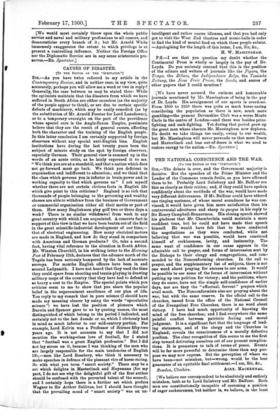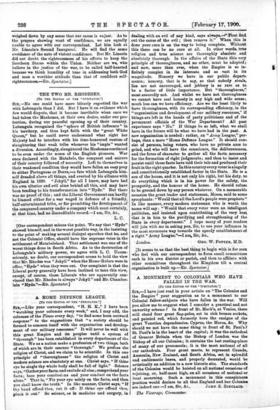THE NATIONAL CONSCIENCE AND THE WAR.
[To THE EDITOR OF THE "SPECTATOR."] SIR,—The debate is over, and the Government majority is decisive. But the speeches of the Prime Minister and the Leader of the Commons remain futile, as you have affirmed them to be. Probably Lord Salisbury and Mr. Balfour see this as clearly as their critics; and, if they could have spoken confidently about the rectitude of the war, would have made very different deliverances. If Mr. Balfour could have uttered one ringing sentence, of whose moral soundness he was con- vinced, it would have given him more satisfaction than his controversial adroitness and sharp to guoque in his reply to Sir Henry Campbell-Bannerman. His closing speech showed his gladness that Mr. Chamberlain could maintain a more confident tone, but he could not have made that speech himself. He would have felt that to have conducted the negotiations as they were conducted, while not believing that war was possible, would have convicted himself of recklessness, levity, and insincerity. The same want of confidence in our cause appears in the admirable call to prayer, and forms of intercession sent by the Bishops to their clergy and congregations, and com- mended to the Nonconforming churches. In the call to prayer, and the supplementary list of subjects, there is not one word about praying for success to our arms. It would be possible to use some of the forms of intercession without putting up one petition for victory; and the petitions, where they do occur, have not the simple self-confidence of earlier days, nor are they the " effectual, fervent" prayers which avail much. The Nonconformists also are praying about the war, but with the same reserve. In the official call to the churches, issued from the office of the National Council of the Evangelical Free Churches, there is no word about victory. I have had much opportunity of knowing the mind of the free churches ; and I find everywhere the same painful conflict between patriotic feeling and moral judgment. It is a significant fact that the language of lead- ing statesmen, and of the clergy and the Churches in England, reveals the consciousness of a morally defective position. The clear recognition of this seems to me the first step toward delivering ourselves out of our present complica- tions. It is premature to talk of terms of peace. Events will be far more powerful to determine these than any pur- pose we may now express. But the perception of where we have been—not mistaken, but—wrong, would be the best guarantee of an equitable final settlement.—I am, Sir, &c.,
[We believe our correspondent to be absolutely and entirely mistaken, both as to Lord Salisbury and Mr. Balfour. Both men are constitutionally incapable of assuming a position of eager cocksureness, but neither is, we believe, in the least
weighed down by any sense that our cause is unjust. As to the prayers showing want of confidence, we are equally unable to agree with our correspondent. Let him look at Mr. Lincoln's Second Inaugural. He will find the same avoidance of the note of violent confidence. But Mr. Lincoln did not doubt the righteousness of his efforts to keep the Southern States within the Union. Neither are we, who believe in the justice of the war, to be called half-hearted because we think humility of tone in addressing both God and man a worthier attitude than that of confident self- righteousness.—ED. Spectator.]







































 Previous page
Previous page